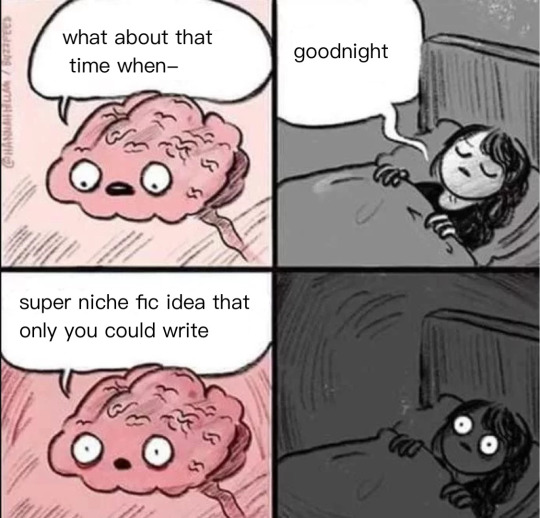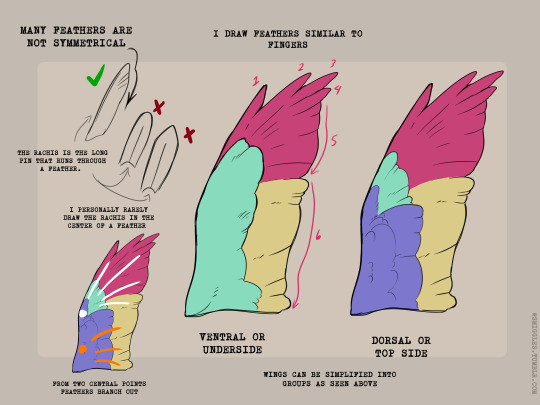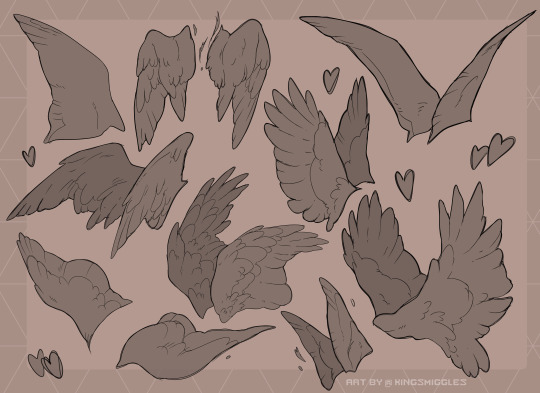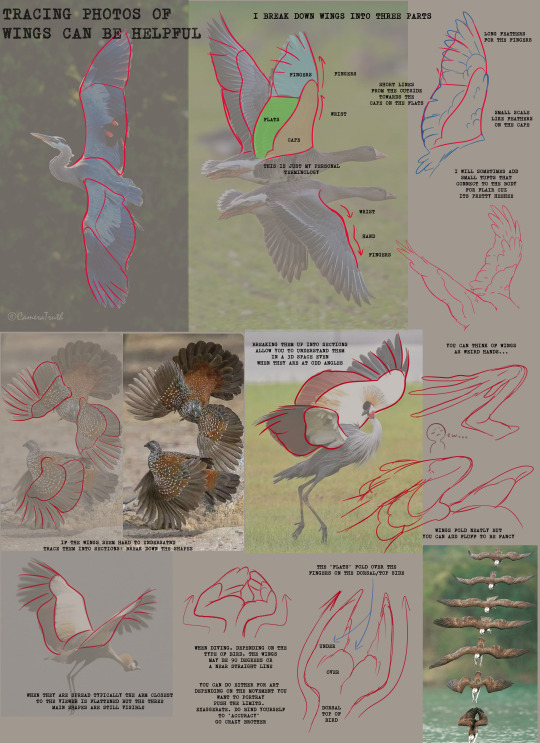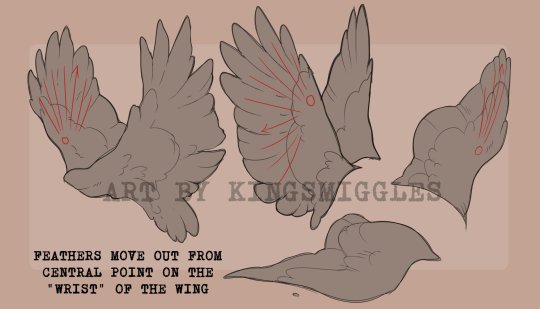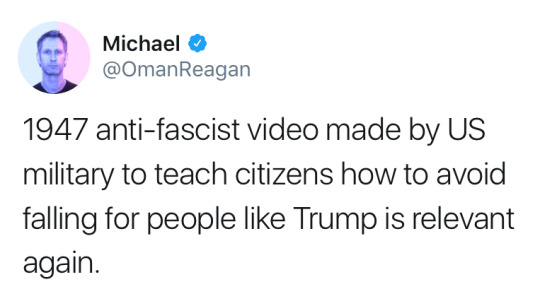Text
"Jules, why are you not posting Star Wars stuff anymore?"
Jules posts SW fanart:

Jules posts for another fandom on the same day:

It's definitely something about an older fanbase entitlement and the way too many people treat reblogs like they're losing an arm for every single one. If I hear something about "keeping my blog design integrity" again imma riot. Support your creators if you hope to see more certain kinds of stuff. It's that simple.
#Ops tags:#louder for the people in the back#thank you for important addition#tumblr etiquette#my tags:#thank you for reminding me to do this more
46 notes
·
View notes
Text
Fucking hell that is good... What the fuck did you sell your soul to?

I know this isn't ninjago guys but I finished this 17 hour painting for my art class and I was proud of it so...enjoy.
I love Egypt fun fact about me. :)
77K notes
·
View notes
Text
😳 <- this emoji but without the blush or romantic connotation. im not blushing im staring you directly in your fucking eyes
194K notes
·
View notes
Note
any advice for when you have a really good idea, but no concrete plot?
Ooh, yes! This happens to me all the time. It's why my "Story Ideas" list is about a hundred miles long 😅
Pick One Conflict
Envision your idea and ask yourself what's one conflict that could have led to that OR could happen as a result of it.
Got a character? Think of a personality trait they have and what conflicts might happen to feed that trait or because of that trait.
Got a setting? Who lives there? What's the history of that place? You'll find your single (i.e., manageable to invent) conflict in no time.
Interview Your Idea
Ask what your character is feeling right now or when you thought of them. Why do they feel that way? What scenario would change that feeling?
If you've got a setting, ask it what made it that way. Why is it uninhabited? Why are people congregating in one part of it? Follow your questions while taking notes. You don't have to use all of them--or any of them!--but they'll get your brain going if there's a story there.
Ask Why It Matters
Why did this idea strike you as notable? Did you feel something when you thought of it? That emotion may tie to a theme or event you can use as inspiration for your plot. Once you're motivated, the story will come to you.
---
Something I'm always telling myself: it's absolutely okay to get a story idea and never do anything with it!
Creating that idea was its own creative writing practice. Stick with the stories that feel important or interesting to you, not the ones you feel obligated to flesh out.
I hope this helps! 🩵
#writeblr#writing advice#creative writing#writers of tumblr#writing help#thank you for this op#this honestly helped a lot
24 notes
·
View notes
Text
On Not Writing
Hi! I'm back. i had a fun two days of doing absolutely nothing writing related, including scrolling this blog. Wife and I played a lot of Valheim. Took a lot of bike rides. Watched Interstellar for the first time - pretty good, kind of silly at the end. It was my first two-day weekend in probably three months, so it was much-needed, hard as it was.
And it got me thinking of some things I wanted to say to the community here. It's especially targeted towards younger writers, of which I used to be one, but I think it can apply to anyone who finds themselves despairing over how much they aren't writing.
Let's imagine you're sitting with me in this coffee shop. It's an overcast Portland morning and I just inadvertently vivisected a croissant. And as we sip our drinks (I ordered a lavender latte), you lament to me. I don't know what to do, Clove. I just haven't been writing!
You know what I say to that?
Good.
This is a new hot take of mine that I, once again, worry about upsetting people with. Because I see a lot of guides here about how to write, or how to write consistently, or how to write through writers block. But I haven't seen a single person talking about the inverse - how to not write. Or - perhaps more accurately - how to exist as a human being separate from your identity as a writer.
This is a problem for me.
Listen - I started young. I was 12 when I wrote my first novella, and 13 when I completed my first novel the next year. Adults in my life were impressed by the big-eyed child writing so many words. They encouraged me. I wrote two more novels, and they continued to encourage me. Because of the potential, right? I could be successful. I could be famous.
People stopped pushing me to try other things. I saw I was getting validation as a writer, so that only pushed me to continue fixating over something I was already enjoying and getting pretty good at. Dad had me writing two thousand words every day, because that's what Stephen King did. At 16 I finished four full-length novels, which everyone thought was really cool and interesting. I was also sporting dual hand braces every day throughout the winter to cope with the carpal tunnel I still struggle with to this day.
There is encouraging a person in their passion. There is also poisoning them with the belief that their self-worth comes from pursuing that passion. This is entirely, absolutely, even more true for younger writers and artists.
I am enraged for the young writer in my heart and in my head. Because they worried about a lot of the same things I see people worry about on here. Oh, if I don't write I'm not a writer! And to an extent they're right, as to be a writer you need to at some point write some stuff.
But here's the fucking thing, Young Clover - a child should not strive for the work ethic of a professional adult. You did not need to write 2k words a day to be a writer. You were a writer as soon as you updated that terrible Invader Zim fanfiction you wrote when you were 10.
And more than that, though, the most important thing to a person should not be their job and aspirations. If you don't write every day, you're still a writer. If you've never written anything, you aren't - and that's fine. You might write something later down the line, or you might not. Either way you are still entitled to exist on the planet and capable of living a full and passionate and wonderful life.
Hear my words: being a writer is not more important than being a human being.
If you aren't writing right now, maybe you're not supposed to be. Maybe you're meant to be nurturing your relationships, or nurturing yourself. Maybe you're supposed to be volunteering. Or meeting new people. Or gaining a new field of knowledge. Or getting really good at making focaccia bread. Or watching every Mark Wahlberg movie.
I don't like to hear this any more than you do. If I was told that I, for some reason, was not allowed to write for the rest of my life, I would be miserable for maybe a long time. After that passed it's my hope that I would move on and do other things, because my worth is not dependent on being a writer. I like doing it. I like being it, and I hope to be one for the rest of my life. But I never want it to be the first thing people see when they look at me. I don't even like bringing it up in conversation with people I don't already know.
So yeah, if you have "writer's block", maybe consider putting down the pickaxe and getting some rest. Step away entirely from the large boulder that stands between you being the next Stephen King or Brandon Sanderson or Teen Dystopia Writer no. 2321. Take a break, and I mean an ACTUAL break, not the kind where you spend the whole time sulking about work.
I am legitimately begging the writers on here to have developed lives and interests outside of writing. I am begging because I do not have that and it has consistently been one of the hardest things of my life.
You prioritize living outside your writing and it will improve the quality of your writing when you get back to it, as it'll allow you a frame of reference that extends beyond our niche industry. Or it might make you realize that, while you enjoy writing, what you really love is ceramics. Or game developing. Or mutual-aid activism. Or the movies of Mark Wahlberg.
It is not your job to treat yourself like you already have a dozen deadlines and an audience teetering on the edge of disappointment. That's ultimately not going to help you. Your job on this earth is to exist fully, for the sake of the universe that wants so desperately to live vicariously through you.
So breathe. Breathe and calm down. You aren't a failure and there's nothing you have to prove. All you have to do today is drink some water and have a nice snack while you look at a cloud.
Please be kind. All of us need to be kinder to each other and to ourselves.
That's all I want to say. I love you dearly. Please let me know if you need anything.
78 notes
·
View notes
Text
Writing Character CHANGE
Character development is absolutely CRUCIAL to a story, but having spent more time thinking about this topic, I came to the realization that I misunderstood a lot of points other people have made when teaching how to write character development.
There are a lot of factors that play into character development, but in this post, I'll cover some overall, but the main thing concerns any change to your character! (Which is also a huge part in development, really.)
So with this post, I'll be teaching you MY personal tips regarding this subject!
*The Basics*
Before we really get into the developmental stage, there are some things you want to establish, in which I'll explain later!
A couple of flaws.
How your character views themselves at first.
Your character's morals/ideals and how they think.
These things may vary, but you want your readers to be able to at least roughly predict how your character will act during specific events!
*Change*
Character development is just about how your character changes throughout the story. I like to say that there are several different ways one may change, (we'll get into that later on) but your character should NOT stay the same as the same person during the exposition and during the resolution!
"During character development, your character should grow."
This is a common piece of advice; your character needs to grow. And while I've assumed for the longest time that I understood what it meant, it never truly clicked.
While they will use words such as grow, what they really mean is that your character should mature. By the end of your story, your character may not always end up as a better person. When I say mature, I mean that they have reflected back on their life and have understood the consequences that came with their actions (if any) or how they could've done things differently.
Your character will not always end up as a better, fixed person, but they should understand their world and themselves better.
*Negative/Passive Change*
Alright then, so how does a character develop if they don't necessarily change for the better? Well, I'll get into that!
No matter what, your character should have learned a lesson through their experience. Even if they haven't exactly improved as a person, there should be a moral they can learn from what they have gone through.
If not, then did they really grow?
Additionally, how did their qualities negatively impact themselves? If they are bad traits, then it needs to be clear. And the best way to achieve this is by demonstrating how it hurts your character! However, it is rather uncommon for a character to undergo little to no change after a story!
*Positive Change*
Let's circle back to the basics, real quick. Remember how I said that before any development takes place, your character should be anything but perfect? That same thing applies to after the change.
Do NOT create a flawless character by the end of your story. Instead, focus on one or two flaws that get fixed as the story continues. These don't have to be huge, life-changing imperfections, but they can be minor ones that still shape their life in one way or another.
"Fixing" too many shortcomings can make your character seem, well, out of character, producing a character development that's more forced. The same thing applies if you're attempting to FULLY alter a fault that's just too big. The change will be too noticeable.
What am I talking about? Here's an example!
Imagine a character who's incredibly closed off to other people, wanting to ensure that he never gets too close to others.
That's a pretty sizable flaw, no? By the end of your story, you do not want to completely change because you need to preserve character, but you can change it a bit. Does he have a few friends now? Does he understand that there are some people worth trusting?
He may still be closed off to majority of people, but at least it's not everyone, and that's a realistic change.
*Different Changes*
As I continue to read more stories and watch more shows, I have realized that character development is not always about fixing flaws or personality, but it can extend far past that line.
So listen up, because I feel like no one really talks about this.
Your character can change their IDEALS, MORALS, and how they VIEW THEMSELVES.
Hear that? If your character has strong morals, they will hardly stay the same as they reach the end. Remember the requirements I mentioned at the beginning?
See how it connects now? There is SO much more to character development than changing a few imperfections. Like I said in the start, your character needs to grow and mature. Things like new morals or ideals assist with that!
*SUMMARY*
In order to start character development, you need a couple of flaws, an idea of how your character looks at themselves, and their morals. This is because those are the main parts of you character that may change through time.
Growth = Maturing (gaining a better sense of who they are and the world they live in.)
NOT ALL CHARACTER DEVELOPMENT IS POSITIVE!
For negative or passive change, make sure to clarify how their imperfections affected or hurt them and have some sort of moral that follows.
YOUR CHARACTER SHOULD NOT BE PERFECT!
They should not be perfect in the beginning, and not perfect in the end! Do not 'fix' too many traits because you want to preserve character.
I think that's all! It's quite the post for something so simple, eh? But hey, character development is absolutely PIVOTAL to a story so I hope I at least explained the 'change' part of that well!
Happy writing~
3hks <3
#writing#writeblr#writerscommunity#writing tips#creative writing#writing inspo#writing advice#character writing#writing characters development#character development#character change#writing characters change#character building#tips on character development#tips on character building#advice on character building#advice on character development
412 notes
·
View notes
Note
how do you write a liar?
How to Write Liars Believably
Language
The motive of every goal is the make the lie seem plausible while taking blame off the speaker, so liars will often project what they say to a third party: "Katie said that..."
Referring to third parties as "they" rather than he or she
In the case of a deliberate lie prepped beforehand, there will be an overuse of specific names (rather than pronouns) as the speaker tries to get the details right.
Overuse of non-committal words like "something may have happened"
Masking or obscuring facts like "to the best of my knowledge" and “it is extremely unlikely," etc.
Avoiding answers to specific, pressing questions
Voice
There's isn't a set tone/speed/style of speaking, but your character's speech patten will differ from his normal one.
People tend to speak faster when they're nervous and are not used to lying.
Body Language
Covering their mouth
Constantly touching their nose
fidgeting, squirming or breaking eye contact
turning away, blinking faster, or clutching a comfort object like a cushion as they speak
nostril flaring, rapid shallow breathing or slow deep breaths, lip biting, contracting, sitting on your hands, or drumming your fingers.
Highly-trained liars have mastered the art of compensation by freezing their bodies and looking at you straight in the eye.
Trained liars can also be experts in the art of looking relaxed. They sit back, put their feet up on the table and hands behind their head.
For deliberate lies, the character may even carefully control his body language, as though his is actually putting on a show
The Four Types of Liars
Deceitful: those who lie to others about facts
2. Delusional: those who lie to themselves about facts
3. Duplicitious: those who lie to others about their values
Lying about values can be even more corrosive to relationships than lying about facts.
4. Demoralized: those who lie to themselves about their values
Additional Notes
Genuine smiles or laughs are hard to fake
Exaggerations of words (that would normally not be emphasized) or exaggerated body language
Many savvy detectives ask suspects to tell the story in reverse or non-linear fashion to expose a lie. They often ask unexpected, or seemingly irrelevant questions to throw suspects off track.
#writers block#writing#writers and poets#creative writing#writers on tumblr#creative writers#helping writers#let's write#poets and writers#writeblr#resources for writers#writers of tumblr#writers life#writers community#writerscommunity#writer things#writing practice#writing prompt#writing community#writing inspiration#writing advice#writing tips#on writing#writer#writing questions#writing quotes#writing problems#writing process#writing progress
3K notes
·
View notes
Text
The symbolism of flowers
Flowers have a long history of symbolism that you can incorporate into your writing to give subtext.
Symbolism varies between cultures and customs, and these particular examples come from Victorian Era Britain. You'll find examples of this symbolism in many well-known novels of the era!
Amaryllis: Pride
Black-eyed Susan: Justice
Bluebell: Humility
Calla Lily: Beauty
Pink Camellia: Longing
Carnations: Female love
Yellow Carnation: Rejection
Clematis: Mental beauty
Columbine: Foolishness
Cyclamen: Resignation
Daffodil: Unrivalled love
Daisy: Innocence, loyalty
Forget-me-not: True love
Gardenia: Secret love
Geranium: Folly, stupidity
Gladiolus: Integrity, strength
Hibiscus: Delicate beauty
Honeysuckle: Bonds of love
Blue Hyacinth: Constancy
Hydrangea: Frigid, heartless
Iris: Faith, trust, wisdom
White Jasmine: Amiability
Lavender: Distrust
Lilac: Joy of youth
White Lily: Purity
Orange Lily: Hatred
Tiger Lily: Wealth, pride
Lily-of-the-valley: Sweetness, humility
Lotus: Enlightenment, rebirth
Magnolia: Nobility
Marigold: Grief, jealousy
Morning Glory: Affection
Nasturtium: Patriotism, conquest
Pansy: Thoughtfulness
Peony: Bashfulness, shame
Poppy: Consolation
Red Rose: Love
Yellow Rose: Jealously, infidelity
Snapdragon: Deception, grace
Sunflower: Adoration
Sweet Willian: Gallantry
Red Tulip: Passion
Violet: Watchfulness, modesty
Yarrow: Everlasting love
Zinnia: Absent, affection
#writers#creative writing#writing community#writing#writers of tumblr#writing inspiration#creative writers#writeblr#writerblr#writing tips#flower symbolism#writing subtext#writblr#writers corner#how to write subtext#symbolism in writing#writing advice#creative writing tips#writing resources#writing help#writer tips#writing tips and tricks#helping writers#help for writers#references for writers#writing reference#writers block#beat writers block#novel writing
50K notes
·
View notes
Text
things people do after having a nightmare that isn’t crying
struggle to catch their breath
grab onto whatever’s close enough to ground themselves in reality
become nauseous / vomit
shake uncontrollably
sweat buckets
get a headache
things people do to combat having nightmares if they occur commonly
sleep near other people so they can hear the idle sounds of them completing tasks
move to a different sleeping spot than where they had the nightmare
leave tvs / radios / phones on with noise
just not sleep (if you want to go the insomnia route)
sleep during the day in bright rooms
things people with insomnia do
first, obviously, their ability to remember things and their coordination will go out the window
its likely they’ll become irritable or overly emotional
their body will start to ache, shake, and weaken
hallucinate if it’s been long enough
it becomes incredibly easy for them to get sick (and they probably will)
add your own in reblogs/comments!
34K notes
·
View notes
Photo

I know it’s not hard to point out reactionaries hypocrisy when it comes to like safe spaces or hug boxes or whatever but genuinely how much of an echo chamber do you have to exist in for you to think this is a reasonable thing to say
253K notes
·
View notes
Text
Online Writing Resources
YouTube:
Abbie Emmons: A published author. Her videos have great tips and advice for plot and character development.
Hello Future Me: Mostly worldbuilding tips, but very in-depth, with specific examples.
Ellen Brock: A professional freelance editor who provides help with all aspects of writing—outlining, worldbuilding, character writing, plot development, publishing, and generally answering any questions writers may have.
Terrible Writing Advice: Great writing advice, if you can handle the sarcasm.
Podcasts:
Writing Excuses: Albeit fast-paced, the given writing advice is quite useful. There's multiple seasons addressing topics such as story structure, characters, and genres, amongst many others.
The Creative Penn: This podcast is run by author Joanna Penn, who shares the lessons she learned in her own journey and advice for writing and publishing your novel.
I Should Be Writing: Interviews with various authors, and encouragement for aspiring writers.
Story Grid: Outlining methods, writing tips, editing advice, and analysis of various works.
Blogs:
Creativity Portal: Author interviews, creativity generators, writing prompts and templates, and various other writing resources.
Now Novel: Aside from writing tools, this website has multitudes of posts about characters, dialogue, narration, plotting, editing, and story structure, as well as writer motivation.
Helping Writers Become Authors: Tips on dialogue, characterisation, outlining, plot development, structuring, character arcs, and common writing mistakes to avoid.
Almost an Author: This website is great help for aspiring authors, with advice that ranges from genres to motivation for writers to guidance for making writing a career.
Hope this is helpful! I'd love to hear any other resources you use or are familiar with. Happy writing ❤
#writeblr#writing#writing tips#writing advice#writing help#writing resources#creative writing#writer resources#author resources#writer stuff#how to write#writing techniques#story writing#author things#author#writer things#writer help#deception-united
222 notes
·
View notes
Text
THOU, THEE, THY, THINE. SAME THING RIGHT?
NO.
Although they seem very similar, Shakespeare would be in tears if he saw how most people mix them up. lets save William the misery and teach you when to correctly use thou, thy, and thine.
THOU
Thou = You (in subject form)
"Thou art killing me."
"Art Thou crying?"
THEE
Thee = You (in object form)
"I want to kill thee."
"My dog ate thee in my dream."
THY
Thy = Your (before a word that starts with a consonant)
"Thy mother."
"Give me thy duck."
Thyself is used the same as any other thy+word combination like "thy mother" but without a space
"Take care of Thyself."
THINE
Thine = Your (before a word that starts with a vowel)
"Thine unibrow is evident."
"Thou art on thine own."
Now Shakespeare can truly rest in peace.

Go follow me @leisureflame for more posts like this!
670 notes
·
View notes
Text
Filler??? In MY story?!
You'd better believe it. :)
Filling can have its own way of progressing the story -if not the plot, then the understanding of the characters when they're not buried in a plot-alanche.
Moments of rest are necessary for both the characters and the reader.
Moments of softness are necessary for both the characters and the reader.
Moments of 'slice of life' are necessary for both the characters and the reader.
It comes down to one simple to say, yet complicated piece of advice that I keep as a golden rule:
Bring it inward to make it bigger.
496 notes
·
View notes
